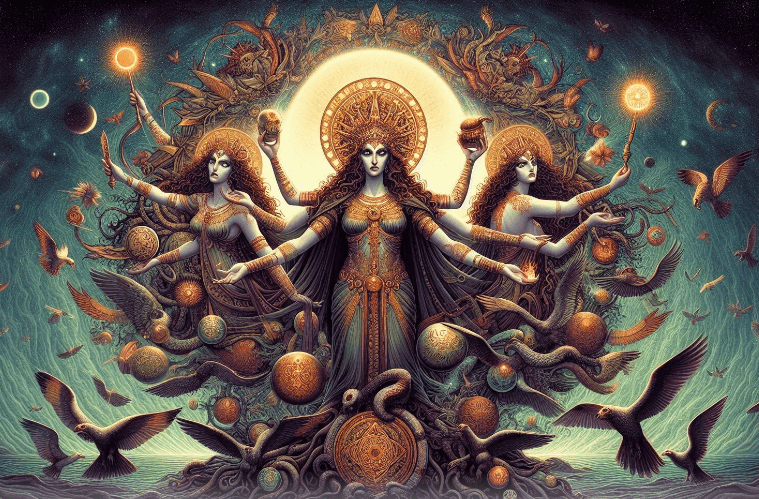Your cart is currently empty!

Unveiling Arcane Secrets and Their Origins: The Mystical Significance of Hecate’s Epithets
In the shadowed realms where the veil between worlds is thin, a goddess of profound mystery and power exists, known by many names and revered in countless forms. Hecate, the enigmatic Triple Goddess, stands at the crossroads of the seen and unseen, her presence a beacon of ancient wisdom and arcane might. She is the guardian of the liminal spaces, the keeper of secrets, and the mistress of magic. Her many epithets, each a key to a different aspect of her divine nature, reveal the depth and complexity of her character. From the underworld to the celestial heavens, Hecate’s influence permeates the fabric of reality, guiding souls through the darkness and illuminating the path to hidden truths. Join us as we embark on a journey through the mystical and historical significance of Hecate’s many names, uncovering the ancient rites and esoteric knowledge that have kept her legend alive through the ages.
Aidonaia – Of the Underworld
Hecate as Aidonaia embodies her dominion over the underworld. This name connects her to the Chthonic deities and the realm of the dead. In ancient rituals, Hecate was invoked as Aidonaia to guide souls through the afterlife and to protect the living from malevolent spirits. The Orphic hymns, ancient texts dedicated to the worship of the gods, often mention Hecate Aidonaia as a powerful protector who ensures safe passage for souls into the afterlife.
Angelos – Messenger
As Angelos, Hecate serves as a divine messenger, bridging the mortal and divine realms. This aspect of Hecate highlights her role in conveying messages from the gods to humans, often appearing at crossroads, a symbol of choices and transitions. In the Homeric Hymns, Hecate is depicted as a mediator who conveys the will of the gods to humans, ensuring that divine messages are correctly interpreted and acted upon.
Apotropaia – Averter of Evil
Hecate’s name Apotropaia signifies her power to ward off evil. In ancient Greece, she was often invoked in protective rituals to avert misfortune and to safeguard homes and cities from harm. Statues of Hecate Apotropaia were placed at doorways and city gates as guardians. These statues, known as Hecataea, were believed to possess the power to repel evil spirits and negative influences, ensuring the safety and well-being of those within.
Brimo – Angry, Terrible One
The epithet Brimo reflects Hecate’s fearsome and wrathful side. As Brimo, she is the avenger of wrongs and the protector of the oppressed. This name emphasizes her role as a powerful and formidable deity who should not be crossed. In ancient myths, Hecate Brimo is often depicted as a fierce warrior who punishes those who commit injustices, ensuring that divine justice is served.
Chthonia – Of the Earth; Of the Underworld
Hecate Chthonia underscores her connection to both the earth and the underworld. This duality represents her ability to traverse the realms of the living and the dead, making her a key figure in rites of passage and transformation. In ancient agricultural rituals, Hecate Chthonia was invoked to bless the land and ensure a bountiful harvest, highlighting her role as a goddess of fertility and renewal.
Dadophoros – Torchbearer
As Dadophoros, Hecate is depicted carrying torches, illuminating the darkness, and guiding souls through the night. This aspect of Hecate is often associated with her role in the Eleusinian Mysteries, where she led initiates through the sacred rites. The torches of Hecate Dadophoros symbolize her power to dispel darkness and reveal hidden truths, guiding seekers on their spiritual journeys.
Enodia – Of the Ways or Crossroads
Hecate Enodia is the goddess of the crossroads, where three roads meet. This name highlights her role as a guardian of travelers and a guide through life’s many paths. Crossroads were sacred to Hecate, and offerings were left there to seek her favor and protection. In ancient times, travelers would leave offerings at crossroads to invoke Hecate Enodia’s guidance and ensure safe passage on their journeys.
Kleidouchos – Keybearer
The title Kleidouchos, or Keybearer, signifies Hecate’s authority over the gates of the underworld and the secrets they hold. She is often depicted holding keys, symbolizing her power to unlock hidden knowledge and to grant or deny access to the mysteries of life and death. In ancient rituals, keys were used as symbols of initiation, representing the unlocking of esoteric wisdom and the opening of new spiritual paths.
Kourotrophos – Child Nurse / Protectress of the Young
As Kourotrophos, Hecate is the nurturer and protector of children. This nurturing aspect of Hecate was invoked in prayers for the health and safety of infants and young ones, emphasizing her role as a guardian of the vulnerable. In ancient Greece, mothers would pray to Hecate Kourotrophos for the well-being of their children, seeking her protection and guidance.
Melinoe – Soothing One
Hecate Melinoe represents her ability to soothe and calm. This name is often associated with her role in easing the suffering of souls in the afterlife and providing comfort to the living in times of distress. In Orphic hymns, Hecate Melinoe is described as a gentle and compassionate goddess who brings peace to the restless dead and comfort to the grieving.
Nyktipolos – Night Wanderer
The epithet Nyktipolos, or Night Wanderer, reflects Hecate’s association with the night and the moon. She roams the darkness, accompanied by her hounds, and is often invoked in nocturnal rituals and ceremonies. In ancient myths, Hecate Nyktipolos is depicted as a mysterious and powerful figure who moves through the shadows, guiding those who seek her wisdom.
Perseis – Destroyer; Child of Perses
Hecate Perseis emphasizes her destructive power and her lineage as the daughter of the Titan Perses. This name highlights her ability to bring about change and transformation through destruction, paving the way for new beginnings. In ancient myths, Hecate Perseis is often depicted as a fierce and powerful goddess who wields the forces of destruction to cleanse and renew the world.
Phosphoros – Light Bringer
As Phosphoros, Hecate is the bringer of light, illuminating the path for those who seek her guidance. This aspect of Hecate is often associated with her role in leading souls through the darkness and revealing hidden truths. In ancient rituals, Hecate Phosphoros was invoked to bring clarity and insight, guiding seekers on their spiritual journeys.
Propolos – Companion or Guide
Hecate Propolos signifies her role as a companion and guide to those who invoke her. She is the trusted ally who leads the way through life’s challenges and transitions, offering wisdom and support. In ancient myths, Hecate Propolos is often depicted as a loyal and steadfast companion who provides guidance and protection to those who seek her aid.
Propylaia – Guardian of the Threshold
The title Propylaia, or Guardian of the Threshold, underscores Hecate’s role as a protector of entrances and boundaries. She stands at the threshold between worlds, guarding against intruders and ensuring safe passage for those who seek her favor. In ancient rituals, Hecate Propylaia was invoked to protect homes and sacred spaces, ensuring that only those with pure intentions could enter.
Skylakagetis – Leader of the Dogs
Hecate Skylakagetis is often depicted with a pack of hounds, symbolizing her role as the leader of the dogs. This name reflects her connection to the animal kingdom and her ability to command and control the forces of nature. In ancient myths, Hecate Skylakagetis is depicted as a powerful and commanding figure who leads her hounds through the night, protecting and guiding those who seek her aid.
Soteira – Savior / World Soul
As Soteira, Hecate is the savior and the world soul, embodying the divine essence that permeates all of creation. This aspect of Hecate emphasizes her role as a cosmic protector and a source of spiritual salvation. In ancient rituals, Hecate Soteira was invoked to bring peace and harmony to the world, ensuring the balance and well-being of all creation.
Trimorphis – Triple Formed
Hecate Trimorphis represents her triple form, often depicted with three faces or bodies. This triadic nature symbolizes her dominion over the heavens, earth, and underworld, and her ability to see past, present, and future. In ancient myths, Hecate Trimorphis is depicted as a powerful and all-seeing goddess who holds the knowledge of all realms and times.
Trioditis – Of the Crossroads
The name Trioditis, or Of the Crossroads, reiterates Hecate’s association with Crossroads and her role as a guide through life’s many choices. This aspect of Hecate is central to her worship, with offerings and rituals performed at crossroads to seek her guidance and protection. In ancient times, Hecate Trioditis was invoked to guide travelers and seekers through the many paths of life, ensuring their safe passage and success.
Conclusion
In the ancient whispers of forgotten rituals and the flickering light of sacred torches, Hecate’s presence is felt as a profound and eternal force. She is the guardian of the liminal spaces, the mistress of the crossroads, and the keeper of the keys to the mysteries of life and death. Her many names, each a testament to her vast and varied powers, weave a tapestry of divine influence that spans the heavens, the earth, and the underworld.
To invoke Hecate is to call upon the very essence of magic and transformation. As Aidonaia, she guides souls through the shadowy realms of the afterlife, ensuring safe passage and protection from malevolent spirits. As Angelos, she bridges the gap between the mortal and divine, delivering messages from the gods and guiding us through the choices and transitions of life.
Hecate Apotropaia stands as a formidable guardian, her power to avert evil and protect the sanctity of homes and cities revered in ancient Greece. The fierce and wrathful Brimo, the avenger of wrongs, ensures that justice is served, while Chthonia, goddess of the earth and underworld, blesses the land with fertility and renewal.
The torches of Hecate Dadophoros illuminate the darkest paths, guiding seekers through the sacred rites of the Eleusinian Mysteries. As Enodia, she watches over travelers at the crossroads, offering protection and guidance. The keys of Kleidouchos unlock the hidden knowledge of the underworld, granting access to the esoteric wisdom that lies beyond the veil.
Hecate Kourotrophos nurtures and protects the young, her gentle and compassionate nature invoked in prayers for the well-being of children. Melinoe, the soothing one, brings peace to the restless dead and comfort to the grieving, while Nyktipolos, the night wanderer, roams the shadows, guiding those who seek her wisdom.
The destructive power of Hecate Perseis paves the way for new beginnings, her lineage as the daughter of the Titan Perses emphasizing her ability to bring about transformation through chaos. As Phosphoros, she is the bringer of light, illuminating the path for those who seek her guidance and revealing hidden truths.
Hecate Propolos, the loyal companion and guide, leads the way through life’s challenges, offering wisdom and support. Propylaia, the guardian of the threshold, stands at the entrance to sacred spaces, ensuring that only those with pure intentions may pass. The leader of the dogs, Skylakagetis, commands respect and devotion, her hounds a symbol of loyalty and protection.
As Soteira, Hecate embodies the divine essence that permeates all of creation, offering spiritual salvation and ensuring the harmony and balance of the universe. Her triple form, Trimorphis, symbolizes her dominion over the heavens, earth, and underworld, her all-seeing nature a testament to her power and wisdom. Trioditis, goddess of the crossroads, guides travelers and seekers through the many paths of life, ensuring their safe passage and success.
To understand Hecate is to embrace the mysteries of the ancient world, to walk the path of the witch and the seeker, and to honor the divine feminine in all its forms. Her many names and epithets reveal the depth and complexity of her character, each one a key to unlocking the secrets of the universe. By invoking Hecate, we call upon a force that transcends time and space, a goddess whose power and influence continue to inspire and guide us through the ages.
In the sacred silence of the night, under the watchful gaze of the moon, let us honor Hecate, the Triple Goddess, and seek her wisdom and protection. May her light guide us through the darkness, and her power transform our lives in ways we cannot yet imagine. Blessed be.






